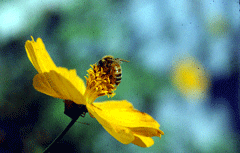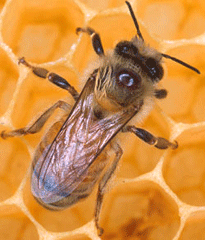Bees’ Burden/Emerging Science Note
Air Date: Week of June 13, 2008

Bee populations are collapsing, and new research shows pollution may have something to do with it. As Margaret Rossano reports, air pollution diminishes the scent of flowers and pollinators can’t always locate their food source.
Transcript
[MUSIC: "Track 70 - Bee Swarm" from 'The Ultimate Digital-Stereo Sound Effects Library, Nature and Animals' ]
There's been a lot of buzz in the news lately about bees. That's because U.S. bee populations both honeybee and wild—have plummeted.
[THEME MUSIC]
Honeybee colonies have declined by almost half in the past 60 years. Scientists aren't sure exactly what's causing so-called Colony Collapse Disorder, but a recent study by a research team at the University of Virginia suggests that air pollution may have something to do with it.
Emissions from vehicles and industry contribute to the formation of air pollutants like ozone. The scent molecules produced by flowers - which help pollinators find them - are extremely volatile, and bond easily with these pollutants.

(Courtesy of the NIH)
The team found that air pollution destroys flowers' aroma by as much as 90 percent. Scent molecules that once traveled three quarters of a mile may now migrate less than one quarter of a mile.
Because scent molecules cover only a short distance before they are chemically altered, it's much more difficult for pollinators to find them. Bees struggle to find food, and flowering plants suffer because they're not pollinated.
It looks like bees may be yet another reason why we need to curb air pollution.
That's this week's note on emerging science. I'm Margaret Rossano.
Living on Earth wants to hear from you!
Living on Earth
62 Calef Highway, Suite 212
Lee, NH 03861
Telephone: 617-287-4121
E-mail: comments@loe.org
Newsletter [Click here]
Donate to Living on Earth!
Living on Earth is an independent media program and relies entirely on contributions from listeners and institutions supporting public service. Please donate now to preserve an independent environmental voice.
NewsletterLiving on Earth offers a weekly delivery of the show's rundown to your mailbox. Sign up for our newsletter today!
 Sailors For The Sea: Be the change you want to sea.
Sailors For The Sea: Be the change you want to sea.
 The Grantham Foundation for the Protection of the Environment: Committed to protecting and improving the health of the global environment.
The Grantham Foundation for the Protection of the Environment: Committed to protecting and improving the health of the global environment.
 Contribute to Living on Earth and receive, as our gift to you, an archival print of one of Mark Seth Lender's extraordinary wildlife photographs. Follow the link to see Mark's current collection of photographs.
Contribute to Living on Earth and receive, as our gift to you, an archival print of one of Mark Seth Lender's extraordinary wildlife photographs. Follow the link to see Mark's current collection of photographs.
 Buy a signed copy of Mark Seth Lender's book Smeagull the Seagull & support Living on Earth
Buy a signed copy of Mark Seth Lender's book Smeagull the Seagull & support Living on Earth

